Kant and His German Contemporaries, Including the Women

Interview by Richard Marshall

'There is a sense in which Kant’s characterization of his thought as a “Copernican revolution” has become something of a self-fulfilling prophecy. Because of Kant’s emphasis on the novelty of his project, Kant scholars (particularly in the Anglo-American context) have concluded that reading Kant’s predecessors and contemporaries could only be wasted effort, since after all whatever they might say Kant is saying something else. This has contributed to a general neglect of the German context, in which a number of key Kantian doctrines (like the spontaneity of the understanding, or the autonomy of the will, to name only two) are pre-figured which, in turn, makes Kant’s views on those and other topics seem utterly new.'
'In any case, once Kant recognized Mendelssohn’s new critique of his own idealism in the Morgenstunden for what it was, he set out to reply. Mendelssohn’s principal criticism was, in effect, that transcendental idealism entails the falsity of our representations of spatial and temporal objects, since it asserts that the forms of sensibility are functions of our imperfections as finite cognizers, and thus is indistinguishable from scepticism.'
'Kant’s exposure of the errors of rational psychology has been among the most widely appreciated parts of his discussion in the first Critique, both in Kant’s own time (it pretty much stopped rational psychology in its tracks) as well as among more recent commentators. But, in addition to exposing its errors, Kant also offers a diagnosis of their ground in transcendental illusion.'
'Wolff was accused of a kind of closet Spinozism by his Pietist colleagues on account of his alleged defense of a fatal necessity in human actions. As it happens, Wolff was a great admirer of Ehrenfried Walther von Tschirnhaus, a Saxon nobleman, scientist, and one of Spinoza’s intimates, and Wolff discussed Spinoza with Tschirnhaus on at least one occasion.'
'There’s important discussion right now relating to expanding the philosophical canon in the early Modern period to include women thinkers, particularly from France and English-speaking countries. The German context, however, at least in the 18thcentury presents some challenges.'

Corey W Dyck specializes in the history of German philosophy, with an emphasis on the eighteenth century. His recent research has focused on issues in metaphysics and the philosophy of mind in the period from Leibniz to Kant. Here he discusses the influence of Hegel on how the German philosophical tradition has been discussed, the importance of Wolff and the Pietists for Kant, Lambert, Tetens and Mendelssohn, the Morgenstunden, Christian August Crusius, Kant's Critique of Pure Reason as a rather pernicious form of scepticism, the Paralogisms of Pure Reason and rational psychology, kant's criticisms of rational psychology and his resulting view of the soul, the relevance of the Fourth Paralogism, the soul and immortality, German materialism, the ‘quarrel of women’ (querelle des Femmes), Erxleben’s ‘Rigorous Investigation’ and why women's philosophy is missing from accounts of early modern German philosophy.
3:16: What made you become a philosopher?
Corey W Dyck: I credit my interest in philosophy to an excellent high school teacher. While philosophy is not typically taught in Canadian high schools (though this is slowly changing), I was lucky in that the three English teachers at my own high school each taught a unit of philosophy in their courses. This included basic logic, largely I suspect to improve student essays, but also Marxism, feminism, and existentialism as theories of literary interpretation. I was particularly fascinated by existentialism and spent much of my Grade 12 year with a copy of Sartre’s Being and Nothingnesstucked under my arm (not that I understood much of it).
When I got to college, my primary interests were in English and American literature and I fully intended to pursue graduate level research in 17thCentury English literature (I particularly enjoyed the metaphysical poets and Milton). However, I continuted to read philosophy on the side, and I came to realise that it was the philosophical themes, like the inevitability of death, or the reconciliability of original sin and freedom, that animated my interest in literature of this period. This led me to take more courses in philosophy, and while my program was fairly limited at the community college I started at, with only three full-time faculty members in philosophy, I was fortunate to have professors who supported me in reading well outside of the course offerings and even tailored their classes to suit my interests. From that point on, my focus was on philosophy, though my undergraduate degree does include a major in English literature.
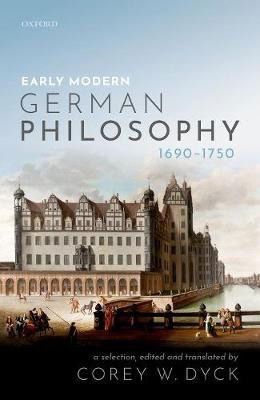
3:16: You’re interested in the German philosophical tradition, and point to the post-Leibnizian pre-Kantian tradition as one that has been largely hidden in the work of Anglo-American philosophy. You’ve also pointed to philosophers lost in the ‘long shadow’ of Kant. Both you and Beiser have pointed a finger at Hegel for dismissing people like Wolff and the nineteenth century German philosophers, but is there more to this than Hegel, and has this had an effect on the way that Kant has been understood?
CD: Hegel is certainly an important factor in the marginalization of a number of thinkers in this tradition, including Wolff. I take it though that Hegel is really just giving expression to an appraisal of Wolff’s contributions to philosophy that was common since Kant dubbed him, in back-handed fashion, the “greatest of all dogmatic philosophers.” For Kant, Wolff and the Leibnizian-Wolffian philosophy more generally, are primarily important in erecting the dogmatic metaphysical system that was vulnerable to the challenge of scepticism, thereby setting the stage for Kant’s decisive, Critical intervention. Kant is thus clearly committed to a certain view of the history of metaphysics, at least of recent developments, with his own (practico-dogmatic) system yielding important progress over these antecedents.
Obviously, Kant has a certain interest in promoting such a selective view of the recent history of philosophy since it underlines the undeniable importance and originality of his own system. Yet, in addition to unfairly framing Wolffian and Leibnizian metaphysics as an uncritical dogmatism (Wolff spent his intellectual career combatting the forces of dogmatism and orthodoxy), it also has the effect of marginalizing a number of important thinkers whose contributions do not fit into the Kantian narrative. Such thinkers are frequently viewed as unsystematic, messy, or “eclectic” thinkers simply because they do not fit into either the Leibnizian-Wolffian-rationalist or the sceptical-empiricistic camp. This certainly has an effect on how we, as contemporary historians, view and appreciate their contributions, especially given that Kantian commitments inform the work of 19thcentury historians of philosophy, including Kuno Fischer and Wilhelm Windelband, who were partly responsible for constructing the historical philosophical canon as we now conceive it.
Beyond that, this also affects the way we conceive of Kant. There is a sense in which Kant’s characterization of his thought as a “Copernican revolution” has become something of a self-fulfilling prophecy. Because of Kant’s emphasis on the novelty of his project, Kant scholars (particularly in the Anglo-American context) have concluded that reading Kant’s predecessors and contemporaries could only be wasted effort, since after all whatever they might say Kant is saying something else. This has contributed to a general neglect of the German context, in which a number of key Kantian doctrines (like the spontaneity of the understanding, or the autonomy of the will, to name only two) are pre-figured which, in turn, makes Kant’s views on those and other topics seem utterly new. I am, of course, willing to concede that even in cases where Kant is borrowing a concept or developing a view found in Wolff, Crusius, or Tetens, he often lends it a new meaning or offers a much more sophisticated defense of it, but that does not imply that we cannot better understand or appreciate Kant’s version of that doctrine by consulting Kant’s sources. And given how notoriously difficult Kant interpretation is, it is surprising that some scholars are unwilling to make use of all of the available resources to shed light on his text.
3:16: How important were Wolff and the Pietists for Kant? You think the Pietists were better at reading Wolff than they’re supposed to have been don’t you? And was Wolff Leibnizean in his detailed systematic psychological writings?
CD: Of course, Kant’s philosophical upbringing is informed by both of these intellectual traditions. While Wolff and the Leibnizian-Wolffian philosophy constituted an exemplary form of dogmatism for Kant, he also credits Wolff with introducing a certain scientific character and spirt of rigour into philosophy. In addition, a number of Kant’s teachers at the Albertina, the university in Königsberg, were Wolffian thinkers (if not necessarily of the orthodox variety). Wolff and Wolffian thinkers seemed to have influenced Kant’s metaphysics in a number of ways, including most generally the division of its topics, but more often serve as a useful foil for the elaboration of his own views. Concerning the Pietist influence, Kant was educated at the Collegium Fridericianum, a Gymansium modelled on the very successful Pietist educational institution founded by A. H. Francke in Halle, though Kant’s recollections of his time there suggest that he did not enjoy (to say the least) the Pietist model of education. Moreover, the significance of this Pietistic influence on his later moral and religious thinking seems overblown and in any case overshadowed by the many and important, anti-Pietistic elements of his mature thinking on, for instance, the interpretation of Scripture or the role of grace in human moral progress.
I should say, however, that my current interest in Christian Wolff and the Halle Pietists is not primarily because of their relevance for understanding Kant (even if it is in virtue of their connections to Kant that I first became interested in them). My own view is that Kant has exercised something of a distorting influence on the histories of 18thcentury thought, particularly of German thought, such that developments in the period are frequently considered as part of a steady development towards him, whether in epistemology/metaphysics, moral philosophy, or aesthetics, or in still other fields. This is an account of the history of Modern philosophy that serves Kantians well (indeed, they’re largely the ones that crafted it), but I think the result is that the topics and debates which Kant did not evidently engage with, or those which he and his contemporaries engaged with but which are perhaps less relatable today, are overlooked, and the philosophers of Kant’s own day and age are not considered on their own terms.
This neglect is particularly regrettable because it leads us to overlook and undervalue what I take to be the first modern intellectual controversy in Germany, the dispute between Wolff and the Pietists. The later controversies in German philosophy, such as the Pantheismusstreitinvolving Mendelssohn, Lessing, and Jacobi, are quite well known, yet the controversy between Wolff and his Pietist colleagues was arguably more influential since it had the effect of setting all of the most contentious issues of the early Modern period—Spinozism, materialism, the antinomy between freedom and necessity, as well as the freedom to philosophize—before the literate German public. But because Wolff is wrongly seen as an arch-rationalistic thinker and the Pietists likewise as anti-intellectualists motivated by personal animus, the importance of this debate for the early development of modern philosophy in Germany, as well as for Kant, is not appreciated.
3:16: How did Kant’s contemporaries Lambert, Tetens and Mendelssohn influence Kant’s thinking? I’d never heard of Tetens but he had interesting things to say about Kant’s account of the acquisition of concepts of time and space didn’t he? Was he a kind of Humean?
CD: Each of these thinkers was important for Kant in rather different ways. Kant and Johann Heinrich Lambert engaged in a correspondance extending from the 1760s to the 1770s that was likely important in Kant’s development towards the Critical doctrine of sensibility, particularly the identification of the representations of space and time as pure intuitions. Lambert was a fascinating figure, and among the many innovations of his Neues Organon of 1764 was the introduction of the term “phenomenology [Phänomenologie] ”into the philosophical lexicon (in the context of an investigation that prefigures Kant’s own Trancendental Dialectic, or doctrine of illusion). By way of confirming his importance for Kant we actually have a draft of Kant’s original dedication of the first Critique to him (Lambert died in 1777).
Johann Nikolaus Tetens was likewise an important influence on Kant—as is well known his Philosophische Versuche (Philosophical Essays) lay open on Kant’s desk as he wrote the first Critique, according to Hamann’s report. Tetens exerted a profound influence on a number of aspects of Kant’s thought, including his account of cognition (Tetens had a sophisticated account of what Kant would call the imagination but what Tetens referred to as the representative power, and also had a fairly developed account of the forms of consciousness), but also on his views on the limits of what can be known about the nature of the soul for instance. Significantly, Tetens was unquestionably on board with Kant’s account of sensibility in the Inaugural Dissertation, even the controversial claim of the ideality of time, and Tetens’ sympathetic attempts to identify and address oversights in Kant’s account make him rather unique in the early reception of Kant’s mature philosophy. Even so, Kant distinguished his methodology from that of Tetens, particularly as concerns their respective accounts of the origin and justification of the pure concepts of the understanding. Tetens’ views on these topics is certainly informed by empiricistic thinkers (he is sometimes referred to as the ‘German Locke’), though Tetens was actually critical of Hume in a way that anticipates Kant. In fact, Tetens is rather diverse in his philosophical pedigree as he was influenced by Scottish commonsense thought, by the Leibnizian-Wolffian philosophy, and by Condillac, among others. Kant clearly respected Tetens as a philosopher, and was understandably disappointed that he left academia without engaging with the first Critique, as Kant thought that Tetens and Mendelssohn would be particularly well-placed to appreciate his insights and contribute to their wider reception.
With respect to Mendelssohn, his relationship with Kant begins with the joint publication of their submissions to the Berlin Academy’s prize essay competition of 1761 (with Mendelssohn taking the first prize), and extends through to Mendelssohn’s final philosophical publication, the Morgenstunden (or Morning Hours) of 1785. Mendelssohn and Kant had an enduring intellectual friendship, with Mendelssohn even visiting Kant in Königsberg in 1777, though Mendelssohn was also one of Kant’s most important critics. His objections in 1770 to Kant’s doctrine of the subjectivity of time in the Inaugural Dissertation (a criticism echoed by Lambert), provoked a series of reflections on Kant’s part that ultimately led to an important refinement of his account in the first Critique. Regarding the first Critique, despite complaining of a nervous debility that made prolonged intellectual effort difficult, there is evidence that Mendelssohn read and engaged with it, and at one point even resolved to pen a refutation of it, a prospect that seemed to have made Kant rather apprehensive (likely because it took him more than a decade to reply to Mendelssohn’s original objection).
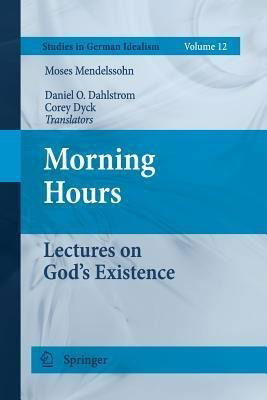
3:16: How important was Mendelssohn’s attack in the Morgenstunden?
CD: With the Morgenstunden, Mendelssohn is trying to do a number of things. First, he’s providing the only detailed overview of his own metaphysics and epistemology; second, he’s intervening in the pantheism dispute—a dispute initiated by F. H. Jacobi’s claim that Lessing had confessed to him that he was a Spinozist; and third, he’s engaging in a criticism of Kant’s Critique of Pure Reason. My own view is that Mendelssohn deliberately (and initially quite effectively, as it turns out) downplayed the criticism of Kant in Morgenstunden because he recognized that Kant would be an important ally against Jacobi, who made his own claims to Kant’s allegiances. As it turned out, Kant did not come out unambiguously in either thinker’s favour, though this was after Mendelssohn’s death in January of 1786.
In any case, once Kant recognized Mendelssohn’s new critique of his own idealism in the Morgenstunden for what it was, he set out to reply. Mendelssohn’s principal criticism was, in effect, that transcendental idealism entails the falsity of our representations of spatial and temporal objects, since it asserts that the forms of sensibility are functions of our imperfections as finite cognizers, and thus is indistinguishable from scepticism. Significantly, Kant’s efforts to reply to this criticism take place at roughly the same time as he was revising the firstCritiquefor its second edition in 1787. That Mendelssohn was on Kant’s mind in the so-called ‘B’ edition is clear, for instance, from the addition to the Paralogisms chapter relating to Mendelssohn’s discussion of immortality in the Phädon; however, my own view is that the famous Refutation of Idealism is also an attempt to respond to Mendelssohn. Considered in this context, the Refutation seeks to undermine the Cartesian presumption of the epistemic priority of inner sense which Kant (correctly, in my view) diagnoses as the ground for Mendelssohn’s objections to his idealism from the initial response to the Dissertation through to the Morgenstunden.
3:16: And were there other figures who were also important if not in quite as direct a way – and were the influences just philosophers or were there other disciplines that mattered to him?
CD: Sure. Perhaps the most important among these other figures is Christian August Crusius, whose influence is felt already in Kant’s Nova dilucidatio of 1755. There, Kant is critical of the Crusian libertarian conception of the freedom of the will and defends, rather surprisingly, the Leibnizian-Wolffian conception, in accordance with which those acts are free which find their sufficient reason in the mind’s distinct cognition of the good. Yet, Kant would later move in his Critical account of freedom towards Crusius’ conception, in addition to adopting a number of other recognizably Crusian doctrines, such as Crusius’ account of the understanding as having an ‘essence [Wesen]’ comprising a set of laws of thinking.
I could mention dozens of other figures among Kant’s German contemporaries who exercised a direct or indirect influence upon him to varying degrees, but the larger point is that this should hardly be surprising. First, and most obviously, Kant did not read English and his French was poor, and fewer works were being published in Latin after the 1750s (even in Germany), meaning that much of what he most readily had access to was through German sources (whether original work or translations). Second, and more importantly, the period in which Kant was active, roughly the 1750s through to the 1790s, was an immensely fertile period in German intellectual history. Not only does it give rise to figures of the stature of Mendelssohn, G. E. Lessing, and J. G. Herder, but it also sees the invention of new disciplines such as aesthetics, anthropology, and experimental psychology. It is therefore to be expected that Kant would find plenty to engage with within the domestic tradition, and the fact that considering this influence on Kant’s thought is sometimes seen as a product of mere antiquarianism, or capital ‘C’ contextualism, only shows that many scholars have yet to fully appreciate the richness of thought in 18thcentury in Germany before and during Kant’s mature period.
3:16: And what of his immediate German successors – how did these thinkers see the Critical philosophy – was it a form of skepticism for them?
CD: There’s no question that a number of thinkers thought the result of the Critique of Pure Reason was a rather pernicious form of scepticism. For much of the 18thcentury before Kant, idealism was taken to be a species of scepticism, an identification that clearly informs Christian Garve’s and J. G. H. Feder’s notorious review of Kant’s first Critique. It was likewise this fear that the principal result of the first Critique was the undermining of any possibility of knowledge of the objects of traditional metaphysics—God, the world, and the soul—as well as any cognition of things beyond their appearances to us that led Mendelssohn for instance to refer to the works of “the all-crushing Kant [desalles zermalmenden Kants]” and to challenge him to build up a metaphysics with as much gusto as he tore the old one down. A similar perspective informs Karl Leonhard Reinhold’s early interaction with Kant (in the Letters on the Kantian Philosophyin 1786), as he does his best to emphasize Kant’s practical-dogmatic metaphysics, which is to say, the fact that Kant’s position provides a new and more stable foundation for belief in, for instance, the immortality of the soul. Kant clearly took this to heart, as the amendments to the B edition of the Paralogisms chapter highlight this fact and correspondingly downplay Kant’s initially rather extensive criticism of rational psychology.
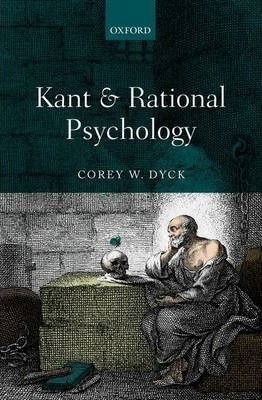
3:16: You’ve discussed Kant’s Paralogisms of Pure Reason and rational psychology, an area that you point out was deeply entwined with his immediate predecessors. Can you first sketch what these Paralogisms are, who he was arguing with and why they are so important? What’s at stake?
CD: The Paralogisms of Pure Reason constitute Kant’s exposure of the error of rational psychologists in claiming to have cognition of the self/soul and his diagnosis of the source of that error in a natural and unavoidable illusion. Concerning the former, Kant identifies four illicit claims relating to the soul: that the I or soul is a substance, that it is simple, that it possesses the capacity of personality, and that the existence of external objects is capable of doubt. Kant focuses on these specific claims because he takes them to be foundational for the putative science of rational psychology which will proceed to argue on their basis for the soul’s immateriality, spirituality (or that the soul is a being endowed with understanding and will), and immortality (that the soul does not naturally pass away and that it will retain its spirituality and personality after the death of the body). In terms of what’s at stake then we can see that these are rather important claims, at least for philosophers in the period, and significantly with respect to immortality, a doctrine that he will go on to endorse in some form as an object of moral belief.
In exposing the error in the case of each of these four claims, Kant proceeds in roughly the same manner (there are some discrepancies in form, particularly concerning the fourth paralogism). So, he identifies a pure concept of the understanding as involved in the predication (substance in the first case, reality in the second, unity in the third, and existence in the fourth). He then shows that there is an ambiguity in the signification of this category in its application to the soul. On the one hand, it can be taken in its “transcendental signification” (or as it would apply to an object in general), in which case Kant allows that it can, indeed, must be predicated of the soul but where the result cannot count as cognition. The rational psychologist clearly does not intend this use of the category since they take the result of its application to be a cognition, and so Kant accuses them of making use of the “empirical signification” of the category, or as it would apply to an object “for us,” but in the absence of fulfilling the conditions of its application first. In the case of substance, for instance, determining the soul as a substance, when that category is used in the latter signification, would require that we apprehend the soul’s persistence through time (in accordance with the schema of that category). Since Kant thinks that this condition is not met in each case—we do not apprehend our own persistence in inner sense—the rational psychologist’s desired conclusion that the soul is a substance in a way that constitutes cognition cannot be taken to follow, and Kant reconstructs this failure as a ‘paralogism’ or a putative syllogism that is faulty in its form given that it contains, due to the ambiguity, four terms rather than three.
Kant’s exposure of the errors of rational psychology has been among the most widely appreciated parts of his discussion in the first Critique, both in Kant’s own time (it pretty much stopped rational psychology in its tracks) as well as among more recent commentators. But, in addition to exposing its errors, Kant also offers a diagnosis of their ground in transcendental illusion. Given that the error involved consists in misusing the category in a cognition-yielding way with respect to an object that can never be given in experience, the question is what could have possibly misled the rational psychologist into falling prey to such an obvious mistake? Kant’s answer is that the I or soul naturally appears to us to be given as an object such that the illicit sense of the predication seems justified. That the soul appears in this way is a biproduct, if you will, of the fact that the idea of the soul is a necessary assumption if we are to have a systematic investigation of inner appearances, though the rational psychologist takes this (perfectly acceptable) assumption of the soul for the sake of organizing inner appearances as a licence to investigate the soul itself, and this is the source of the temptation towards the predications targetted in the individual paralogisms.
3:16: Eighteen century rational psychology was more than just the narrow rationalism of Leibniz and Descartes wasn’t it? Can you say what we’d be missing if we just took those two as a guide to what Kant’s contemporaries were discussing at the time? Wolff’s a key figure here isn’t he?
CD: In the commentaries on the Paralogisms, rational psychology is most often associated with the figures of Descartes and Leibniz and, in accordance with the popular conception of their rationalism, taken to be an investigation of the soul that proceeds purely a priori. This is, on the one hand, unfair to Descartes and Leibniz whose rationalism is rather more nuanced than this, but on the other hand, unfair to Wolff and others who not only offered much more in the way of focused discussion of the rational psychology, but also are fairly clear that rational psychology is not a strictly ‘rationalist’ psychology but depends in a number of key respects on what can be known of the self through experience.
Wolff is a crucially important figure here. The topics of rational psychology had been treated long before, most recently in the context of a pneumatology or doctrine of spirit. Wolff’s signal innovation was divorcing this treatment from the discussion of infinite spirit (God), and re-focusing it on the human soul. This paved the way for the introduction of empirical methods, since we have introspective access to our own minds, and Wolff was clear that his newly-minted rational psychology will use what we can discover in our own cases as the foundation for its inferences and as the touchstone for its findings. In this way, rational psychology is bounded on either side by what experience can disclose to us. It might be allowed that Leibniz and Descartes are sensitive to the role of observation and experiment in scientific investigation, and arguably even incorporate some empirical truths into their respective psychologies (it might even be that the Cartesian I think is to be understood in this way), yet neither elevated this reliance upon experience into a foundational methodological principle as Wolff did, nor did they offer anything like the detailed treatment of these topics that we find in Wolff and the Wolffian tradition. For this reason, I think it helpful to distinguish Wolffian rational psychology from the Leibnizian/Cartesian variety, and more generally to distinguish Wolff’s moderate rationalism from the strict rationalism usually attributed to the Continental rationalists.
3:16: So how does Kant criticize rational psychology and what’s the picture of the soul that he forms in contrast to his predecessors and contemporaries?
CD: As it relates to Kant’s Paralogisms, I contend that it is precisely this alleged basis in experience that Kant is targetting with his diagnosis of illusion. The problem for Kant with Wolffian psychology is that it helps itself to a ‘perception,’ ‘intuition,’ or ‘experience’ of the soul when in fact none is available. This accounts for the rational psychologist’s error—they apply the category in its empirical signification to the soul precisely because they take the soul to be given to us empiricially. As to how the soul acquires this illusory appearance as the object of inner sense, this is a more technical story, but Kant comes to realize that it has its basis in the original connection of the I think to the manifold of sensible intuition, such that when the idea of the soul is generated from the Iof the I think, it retains this empirical residue.
While Kant is thus sceptical regarding our efforts to cognize the I or soul, he does admit that the illusory representation of the soul plays a role in bringing systematic unity to our cognitions of inner appearances, that is, of our mental states and the faculties and powers that ground them. In order to play this role, the soul must be represented in precisely the way that was critiqued in the paralogisms, that is, as a simple substance, persisting over time, endowed with certain higher capacities for understanding and will. It is, for instance, only insofar as we have an illusory representation of the soul as a substance that we can represent its various states as alterations and posit a causal ground for those changes in a power proper to the soul itself. Such an investigation of inner appearances is roughly equivalent to Wolffian empirical psychology, though for Kant it has an important “rational” element inasmuch as the idea of the soul itself is contributed by reason, not to mention that for Kant the resulting claims within empirical psychology are only held to be subjectively valid since they ultimately rely on a representation of the soul that is an illusion (if a natural and unavoidable one).
3:16: The Fourth Paralogism is about the ideality of outer objects and so doesn’t seem to be about criticizing rational psychology, so what’s it’s relevance?
CD: The conclusion of the rational psychologist’s argument in the fourth paralogism is that the existence of outer appearances is doubtful. On its surface, this has little to do with rational psychology, and indeed, it is not unambiguously the case that rational psychologists historically defended idealism. Despite this, Kant evidently thought that the illusion that underlies the other faulty inferences of the rational psychologist also plays a role in motivating this conclusion. Briefly, it is on account of our assumption that the existence of the soul is known through an immediate inner perception, and as such is indubitable, that we proceed to conclude that the existence of outer objects, which can only be inferred as the causal ground of our perceptions of them, is capable of doubt. But Kant contends that transcendental illusion is at play here as it tempts us to think that the existence of the I or soul itself is disclosed by means of inner perception, when in fact it is only the existence of a given representation from which the existence of the empirical self (and not the I or soul) is likewise inferred.
3:16: Despite his criticism of rational psychologists’ arguments for the immortality of the soul didn’t Kant think the soul was immortal?
CD: I suppose ‘think’ is the key word here. Since we cannot cognize the soul’s substantiality, simplicity, or personality, all of which would be required to prove its immortality, Kant contends that we cannot claim to know that the soul is immortal. However, given that the immortality of the soul is an essential component of the conception of the highest good—the apportioning of happiness in accordance with the worthiness to be happy, which cannot take place in this life but requires the postulate of immortality—Kant allows that we must believethat the soul is immortal. It bears noting here, though that this claim that the soul’s immortality is only an object of moral belief has roots in his predecessors, as both G. F. Meier and Crusius contended on the one hand that we cannot prove demonstratively that the soul is immortal and on the other hand that we nonetheless have warrant to believe in immortality on account of that doctrine’s importance as a foundation of morality. While the relative importance of Meier and Crusius for Kant is a matter of recent discussion, these are both important thinkers for Kant (Meier wrote the logic textbook Kant used in his classes), and this is another example of what was taken to be a distinctively Kantian doctrine that is importantly pre-figured by his contemporaries.
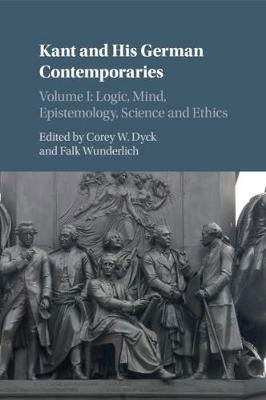
3:16: With all this Kantian Idealism in the ascendency the story has been that German materialism in the eighteenth century was rather a clandestine affair that was only unwittingly propagated but you challenge this view don’t you? So was Lucretian, Hobbesian and Spinozian materialism more mainstream than we’ve been led to believe?
CD: Radical philosophy in the early 18thcentury in Germany is quite fascinating. At a time when there seemed to be little in the way of influence of modern ideas in the German academy, there was a lively current of radical philosophical thinking running through Berlin but also Leipzig, Halle, Danzig, and Hamburg. This was largely a clandestine affair—rich treatises published anonymously and widely transmitted in handwritten copies—but it opened a channel for the spread of materialism, Socinianism, pantheism, and Spinozism outside of the universities. Among the most important German thinkers in this Continent-wide phenomenon were Friedrich Wilhelm Stosch and, my personal favourite, Theodor Ludwig Lau, both of whose texts I have translated in my recent collection. It is difficult to classify texts by either of these thinkers as straightforwardly ‘Spinozistic’ and even if they are materialistic in their views of the mind, it’s not always clear who they are drawing on. Rather, they tended to be fairly eclectic (in the good way) in their influences, borrowing what suited them in advancing their broader philosophical ends.
What’s interesting in the German context is that “mainstream” thinkers like Wolff and Meier, but also (broadly) Pietistic thinkers like Christian Thomasius and Crusius end up defending positions that bear a striking resemblance to some of these radical philosophers. So, Wolff defends the possibility that matter can have representations (but denies that it thinks properly speaking), while Meier denies that the immateriality of the soul implies its immortality. Among Pietistic thinkers we find some flirting with still stranger views of the soul, and even in Crusius’ case claiming that the soul must be an impenetrable substance in order to move the body through a direct physical influence. I don’t think that these mainstream thinkers draw these claims from the radical philosophers (though Lau was a student of Thomasius at one point), but I do think that the agreement in some of their views testifies to the fact that some German academics in this period were quite liberal and non-dogmatic in their views.
That said, I do think Wolff plays a particularly interesting role in the reception of Spinoza in the 18thcentury. Wolff was accused of a kind of closet Spinozism by his Pietist colleagues on account of his alleged defense of a fatal necessity in human actions. As it happens, Wolff was a great admirer of Ehrenfried Walther von Tschirnhaus, a Saxon nobleman, scientist, and one of Spinoza’s intimates, and Wolff discussed Spinoza with Tschirnhaus on at least one occasion. Yet, Wolff vigorously denied the charge of Spinozism, and his final decisive reply comes in a full-dress refutation of Spinoza in the second volume of his Theologia naturalis which constitutes the only detailed discussion of Spinoza by a major thinker since Bayle’s Dictionary article. I happen to think that Wolff’s discussion is quite sensitive, even as he stresses the differences between his and Spinoza’s metaphysics throughout. In any case, Wolff’s alleged refutation becomes a topic of discussion in the later Pantheismusstreit as Lessing and Jacobi on one side and Mendelssohn on the other debate the effectiveness of Wolff’s criticism.
3:16: You’ve an interest in eighteenth century women philosophers. Despite itsneglect by contemporary historians of philosophy, the ‘quarrel of women’ (querelle des Femmes) was a pan-European debate that had gone on for a couple of centuries before the eighteenth century wasn’t it and led to a wider dispute regarding women’s natures , the querelle des dames. Can you sketch for us how the battle lines were drawn between the defenders of women and their detractors and who some of the notable players were leading up to the eighteenth century German version – in particular where and how does the dispute pan out amongst the better known male philosophers of the time?
CD: The querelle des femmesis typically taken to start in the early 1400s with Christine de Pizan’s Book of the City of Ladies which constituted a response to the vicious depictions of women contained in parts of a 13thcentury French allegorical poem called the Roman de la Rose. Pizan undertook to defend the virtues of women through drawing on prominent examples found in antiquity, Scripture, and mythology. This gave rise to a wider debate concerning, for instance, woman’s nature as distinct from man, her suitability for various offices and her capacity for education, formal or otherwise. Over the course of centuries, the debate produced a genre of writing all its own—and the fact that the treatises produced are highly polemical, sometimes satirical, and frequently concerned (strained) interpretations of classical and Biblical texts, has limited the interest in and accessibility of these texts for contemporary historians of philosophy. The varied disputants coalesced into two sides: the defenders of women, who praised women often in exaggerated terms and sometimes making the case for their superiority to men, and the detractors of women, who likewise engaged in over-the-top polemics and produced some incredibly misogynistic texts that in spite of their incendiary content (or because of it) gained a wide readership. As might be expected, the majority of the contributors to the querellewere men, though there are some notable contributions by women on the former side, including figures like Marie de Gournay, Lucrezia Marinella, and Anna Maria von Schurman.
The querelle was a pan-European debate, though the German context is particularly fascinating (and rather overlooked compared to the English, French, and Italian contexts). A couple of arguably the most important, but certainly among the most distinctive contributions were on the part of German writers. So the hermetic thinker Heinrich Cornelius Agrippa von Nettesheim’s On the Nobility and Pre-Eminence of the Female Sexof 1529 was one of the touchstones on the side of the Frauenfreunde, whereas an anonymous dissertation of 1595 arguing that women are not, in fact, human beings(!), set off a vigorous academic dispute but also seemed to have fanned the flames of popular misogyny. According to a report by a later female author the opinion defended in the dissertation had spread to even the smallest village (it bears noting that the dissertation itself may have been intended as a satire of literalist interpretations of the Bible by anabaptists, though this narrow scholarly aim was quickly lost sight of and the publication of the dissertation caused very real harms).
The German contributions to the querelle began to take on a less archaic form in the 1700s, with the publication of numerous lexica cataloguing the contributions of learned women from both antiquity and modernity. Beginning in the early 18thcentury, mainstream German thinkers and educational innovators, such as Christian Thomasius and A. H. Francke began to pay serious attention to the question and character of women’s education. Thomasius made clear that part of the reason he published in German was to make his anti-Scholastic logic more accessible to those who have no access to a university education, especially women, and Francke started up a girl’s school within his Orphanage (though it was relatively short-lived).
3:16: A key text in the eighteenth century debate was Erxleben’s ‘Rigorous Investigation’. The author was quite an extraordinary woman herself wasn’t she? Before looking at her text can you tell us a little about the woman and her context within both Enlightenment reform and pietism too, particularly around the vexed issue of women’s education. She was the first woman in Germany to hold a doctorate wasn’t she and her text broke away from the largely theologically focused debates that had dominated the querelle literature before her didn’t it?
CD: Erxleben’s life is fascinating, and while she faced substantial obstacles to gaining her medical doctorate, I don’t think they differ in kind from those faced by women today working in any number of professions. She was born in 1715 in Quedlinburg in the Harz mountains (the lovely city which was largely unscathed through both world wars is now a UNESCO world heritage site). Her father was a doctor himself, who was an admirer of Thomasius and clearly inspired by Francke’s educational project. She received an excellent (private) education, including lessons on Latin and medicine, and when she was of age frequently assisted her father in his practice. In the early 1740s she resolved to take the examinations at the nearby university in Halle to get her medical degree, and was officially given permission by Frederick the Great (who had recently ascended) to do so. However, the death of a cousin, leaving behind 5 children, led her to suspend those plans as she took over their care and married their father, Johann Christian Erxleben, a deacon. Erxleben continued to practice medicine, but a baseless complaint by three colleagues led to a public dispute, and the local magistrate ordered Erxleben to attain the degree if she wanted to continue to practice. This she did, after giving birth to another child, in 1754, during a lengthy examination in Halle in Latin, and her dissertation was published in her own German translation. After that, little is known of her life, oddly, and she died in 1762.
In addition to all that, in 1742 Erxleben published her Rigorous Investigation of the Causes that Obstruct the Female Sex from Study, a text in which she both identifies the opinions about women that have been cited as reasons for their unsuitability for education, and exposes them as groundless prejudices. It amounts to a comprehensive refutation of the specious philosophical, theological, physiological, and psychological grounds for denying women access to study. Rather boldly, Erxleben also advocates for the co-education of men and women, a fairly radical proposal at the time though for her one that is all the more important if we are to prevent these prejudices from taking root within young men.

3:16: What was she specifically debating in her ‘Investigation’and what makes it ‘the most philosophically informed of the German contributions to the querelle? You make the point that what is distinctive about her approach is not so much the rehearsal of rebutting arguments opposing women but with ‘her strategic engagement with contemporary philosophical theories in her discussion, in particular two doctrines it would be helpful for you to flesh out a bit for us – Thomasius’ novel conception of “learnedness” and his analysis of “prejudice”. Can you tell us about this.
CD: What’s nice about the Rigorous Investigationis that it quickly dispenses with questions like “are women human,” and a pre-occupation with Scriptural exegesis, and moves to address the more concrete forms that misogyny takes. She addresses, for instance, the opinion that women are more dominated by passions than men, making them less susceptible to education, or that women possess certain intellectual qualities to a lesser degree than men do. Her larger argument against these prejudices consists simply in pointing out the fallacious inference from what may be woman’s current situation to some claim about her nature. So, Erxleben concedes, at least for the sake of argument, that women may have less control over their passions than men, but that this is the result of the lack of access to the sort of discipline afforded to boys in school and not a reflection of a difference in natures.
Erxleben is very strategic in her text, appreciating that it is both an argument for women’s capacity for education, and an illustration of what one woman is capable of, namely herself. To this latter end, the text is replete with learned references to the latest physiological, psychological, and philosophical theories. Of particular importance for her is Thomasius, whose conception of learnedness as a kind of knowing oriented towards the demands of practice, rather than mere Scholastic erudition, is taken by Erxleben (quite conformably to Thomasius’ intentions) as something well within women’s capacity to attain. Erxleben also borrows Thomasius’ account of prejudice, which he thought it the business of study to remove, though here she identifies a number of deficiencies in Thomasius’ account. First, the prejudices that Erxleben identifies are not of the sort Thomasius identifies (relating to authority and precipitancy); second, Erxleben makes clear that the prejudices she identifies are even more pernicious inasmuch as they obstruct women from access to study altogether; and third, these are prejudices that are to some extent re-inforced by study. In this way, Erxleben is trying to leverage the hostility to prejudice expressed by Thomasius, and common among early Enlightenment thinkers, and redirect it towards rooting out the baseless opinions that obstruct women’s access to education.
3:16: Ironically women still don’t figure in the canon of early German Modern philosophy. Is Erxleben right to say the failure to acknowledge women’s philosophical achievements and contributions is down to prejudice? And is there something about German philosophy, or philosophy generally that encourages the prejudice, or is it just the usual challenge for feminists everywhere?
CD: I have no doubt that Erxleben would think it important to recognize women’s contributions and achievements, but her focus in the Rigorous Investigation is on making it clear that education is something that all human beings in principle are capable of and that it is essential if we are to realize our ends and flourish. But certainly she’s right that misogynistic prejudice is a major obstacle to this, and in foregrounding prejudice in this way her discussion links up directly with later feminist critiques.
When one does a little research in the history of feminist thought, one frequently finds that arguments, concepts, or views that we thought were distinctly contemporary have a long history. Part of this is because misogyny itself has a long history and women and others writing on their behalf have long sought to combat it. But the distressing thing, and what makes this different than the usual sort of pre-figuring that we find in practicing the history of philosophy more generally, is that whatever impact these arguments make is usually quickly forgotten and the authors themselves subject to a kind of erasure from the historical record. So, a subsequent female German author, writing only a half-century after Erxleben on a similar topic notes that she has heard about Erxleben’s text but cannot find a copy to consult. I don’t think that that is a particular challenge for the history of German philosophy, or of French or English philosophy for that matter, but it is a distinctive challenge for the history of feminism, and I think it is a challenge that requires a wider range of resources and skills to address.
3:16: As a take home, apart from Erxleben, who else would you think ought to be considered as part of the canon of eighteenth century German philosophy?
CD: There’s important discussion right now relating to expanding the philosophical canon in the early Modern period to include women thinkers, particularly from France and English-speaking countries. The German context, however, at least in the 18thcentury presents some challenges. Some of the principal texts that concern philosophical themes written by women are translations into German or efforts to render philosophical systems by prominent male thinkers more accessible. Examples here are Johanna Charlotte Unzer and Luise Adelgunde Viktorie Gottsched, and while their writings are extremely valuable and important, the fact that they are regarded as less “original” means that they don’t fit in a straightforward way into the kind of works we tend to label canonical. In general, the conditions under which women were writing tended to have the consequence that the texts they produced were non-standard—not the typical sort of self-standing argumentative treatise, but views expressed in correspondence, novels, poetry, or still other forms, including non-primarily-textual modes of expression like editing a journal, moderating an intellectual exchange, or initiating an academic debate. Adding to the historical canon is obviously important, particularly when it comes to producing resources for teaching philosophy in class, but too much focus on issues of canonicity and non-canonicity can also have the effect of drawing our attention away from the many and subtle ways in which women, and other under-represented groups, have found to engage in the broader intellectual culture.
3:16: And finally are there five books other than your own that you can recommend to the curious readers here at 3:16 that will take us further into your philosophical world?
CD:
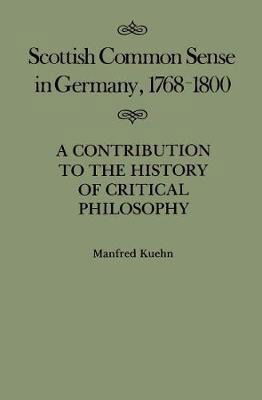
Manfred Kuehn, Scottish Common Sense in Germany, 1768-1800
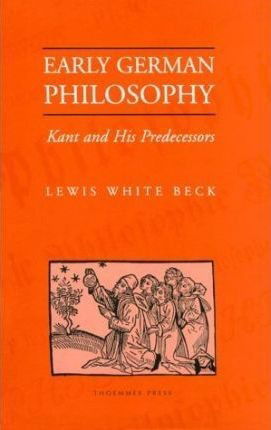
Lewis White Beck, Early German Philosophy: Kant and his Predecessors
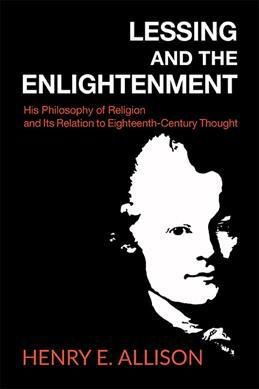
Henry E. Allison, Lessing and the Enlightenment
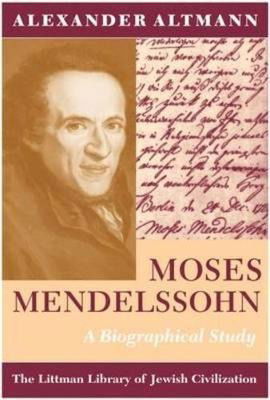
Alexander Altmann, Moses Mendelssohn: A Biographical Study
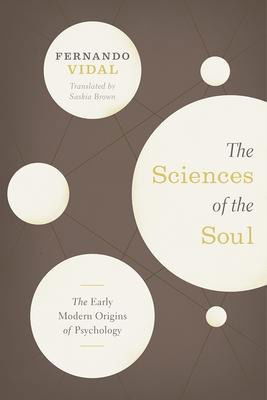
Fernando Vidal, The Sciences of the Soul: The Early Modern Origins of Psychology

ABOUT THE INTERVIEWER
Richard Marshall is biding his time.
Buy his second book here or his first book here to keep him biding!
End Times Series: the index of interviewees
End Time series: the themes